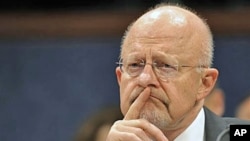Members of a U.S. congressional panel expressed concern Thursday that Iranian President Mahmoud Ahmadinejad's ties to several Latin American leaders could pose a threat to U.S. national security. Director of National Intelligence James Clapper told the U.S. House of Representatives Committee on Foreign Affairs that senior Iranian officials are "now more willing to conduct an attack in the United States." He said Iran is trying to penetrate and engage in the Western Hemisphere.
The chairwoman of the Committee on Foreign Affairs, Ileana Ros-Lehtinen, said some people might question whether the Iranian-Latin American connection is a threat, but she said there is cause for concern.
"Iran’s [President Mahmoud] Ahmadinejad recently returned from his ‘Tour of Tyrants’ trip to visit Venezuela, Nicaragua, Cuba and Ecuador. Media reports have indicated an increased presence of Iran’s Quds Force in these countries and offices of Iran’s intelligence services surfacing throughout the region," said Ros-Lehtinen. "The fact that the military arm of a state-sponsor of terrorism has its operatives within multiple countries in our hemisphere is certainly cause for alarm and merits congressional focus."
Obama administration officials say the United States is keeping a close watch on Iranian President Mahmoud Ahmadinejad's ties to Venezuelan President Hugo Chavez. During Ahmadinejad's recent visit to Venezuela, he and Chavez praised each other and joked about concerns in the West about Iran's relations with Latin America.
The United States and Europe have been tightening sanctions on Iran in recent months because they say Iran is trying to develop nuclear weapons. Iran says its nuclear program is for peaceful purposes.
Democratic Representative Gary Ackerman of New York said that given Iran's actions, Tehran can expect increased international isolation.
"Ahmadinejad can rack up all the frequent flyer miles he wants, and he can figure out how to convince the people that tyranny would be better and that the waste of war is superior to the fruits of peace. He will continue to find welcome only in the most marginal and radical of states," said Ackerman.
Michael Shifter, president of the Washington-based public policy group Inter-American Dialogue, agreed. He said that unlike in 2009, it is important to note that Ahmadinejad did not visit Brazil during his recent Latin American tour.
"Iran is trying to expand its support in the region, and Ahmadinejad did visit four countries on his recent visit to reinforce the few ties he still has in the world. But his efforts have not been successful. And the four countries he visited, Venezuela, Nicaragua, Cuba and Ecuador are less and less relevant to regional politics," said Shifter.
Also on Thursday, the Senate Banking Committee approved tough new sanctions on Iran, which now will have to go to the full Senate floor.
US Lawmakers: Iran's Latin America Ties Pose Threat to US
- By Cindy Saine




